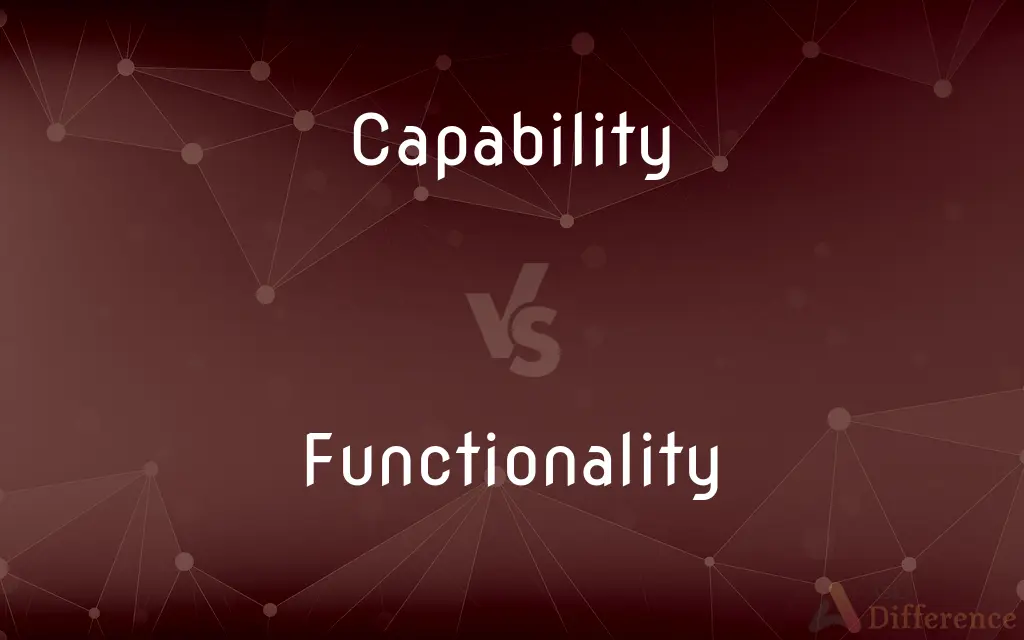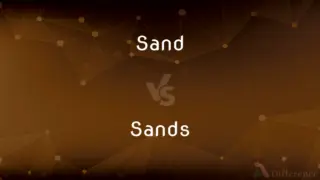Capability vs. Functionality — What's the Difference?
By Tayyaba Rehman — Updated on November 2, 2023
Capability refers to the ability or potential to do something, while functionality pertains to the range of operations or practical uses something offers.

Difference Between Capability and Functionality
Table of Contents
ADVERTISEMENT
Key Differences
Capability represents the potential or inherent abilities of a person, organization, or object. It implies the capacity to achieve a certain outcome or perform various tasks. When discussing a person's capabilities, it often relates to their skills, knowledge, or talent. In the context of technology or machinery, capability refers to what the system or device is potentially able to do, given the right conditions.
Functionality, on the other hand, focuses more on the practical uses or operations that something can perform. It is about the range of functions or features that a device, system, or software offers. Functionality is often assessed in terms of how effectively these functions are executed and how they serve the intended purpose or solve specific problems.
In terms of application, capability often precedes functionality. For instance, a smartphone has the capability to access the internet based on its design and built-in technology. However, the functionality of the smartphone includes specific features like browsing web pages, downloading apps, or streaming videos. Functionality is the realization or execution of the capabilities.
While capability is more about potential, functionality is about practical execution. A company might have the capability to expand internationally due to its resources and market position, but the actual functionality of this expansion involves the practical steps, strategies, and operations necessary to make it successful in a global market.
Comparison Chart
Definition
Potential or ability
Range of operations
ADVERTISEMENT
Focus
Inherent ability
Practical use
Context
Often implies potential
Centers on execution
Example
Technological capabilities
Software functionalities
Application
Precedes functionality
Realization of capability
Compare with Definitions
Capability
Capacity to perform
The robot's capability for precision is impressive.
Functionality
Range of operations
The machine's functionality includes multiple modes.
Capability
Technological potential
This device has the capability for high-speed data processing.
Functionality
Practical use
The app's functionality makes it user-friendly.
Capability
Potential ability
Her capability in mathematics is outstanding.
Functionality
Execution of tasks
The software's functionality streamlined our workflow.
Capability
Inherent power
The engine's capability for high performance was notable.
Functionality
Effective operation
The camera's functionality in low light is remarkable.
Capability
Skill or talent
His leadership capability is well recognized.
Functionality
Performance of features
Its advanced functionality sets it apart.
Capability
The power or ability to do something
The company's capability to increase productivity
He had an intuitive capability of bringing the best out in people
Functionality
The quality of being functional.
Capability
The quality of being capable; ability.
Functionality
A useful function within a computer application or program.
Capability
Often capabilities A talent or ability that has potential for development or use
A student of great capabilities.
Functionality
The capacity of a computer program or application to provide a useful function.
Capability
The capacity to be used, treated, or developed for a specific purpose
Nuclear capability.
Functionality
(uncountable) The ability to do a task, performance, or execution; a set of functions that something is able or equipped to perform.
Capability
The power or ability to generate an outcome
Functionality
In United States trademark law, the tendency of a product design to serve a function other than identification of the product, preventing that design from being protected as a trademark.
Capability
(computing) A digital token allowing a user or process to interact in a specified way with an object that is subject to access control.
Functionality
The presence of a functional group.
Capability
The quality of being capable; capacity; capableness; esp. intellectual power or ability.
A capability to take a thousand views of a subject.
Functionality
Capable of serving a purpose well;
Software with greater functionality
Capability
Capacity of being used or improved.
Capability
The quality of being capable -- physically or intellectually or legally;
He worked to the limits of his capability
Capability
The susceptibility of something to a particular treatment;
The capability of a metal to be fused
Capability
An aptitude that may be developed
Common Curiosities
Does functionality depend on capability?
Yes, it's the practical application.
Can a person’s capabilities be developed?
Absolutely, through learning and practice.
Can capability exist without functionality?
Yes, capability can be unutilized potential.
Are all capabilities utilized?
Not always; depends on opportunity.
Can functionality be improved?
Yes, through updates or enhancements.
Is functionality always technology-related?
Often, but it applies to various fields.
Does capability imply success?
Not necessarily; it’s potential.
Is capability measurable?
Often qualitatively assessed.
Does functionality focus on efficiency?
Yes, it’s about effective use.
Are capabilities innate or acquired?
They can be both; depends on context.
Does increased functionality mean complexity?
Not necessarily; it can be user-friendly.
How do you identify capabilities?
Through assessment or testing.
Can capabilities change over time?
Yes, they can evolve or diminish.
Is functionality limited by design?
Yes, it's based on designed features.
Does high functionality guarantee user satisfaction?
Not always; user needs vary.
Share Your Discovery

Previous Comparison
Sand vs. Sands
Next Comparison
Helical vs. HelixAuthor Spotlight
Written by
Tayyaba RehmanTayyaba Rehman is a distinguished writer, currently serving as a primary contributor to askdifference.com. As a researcher in semantics and etymology, Tayyaba's passion for the complexity of languages and their distinctions has found a perfect home on the platform. Tayyaba delves into the intricacies of language, distinguishing between commonly confused words and phrases, thereby providing clarity for readers worldwide.














































